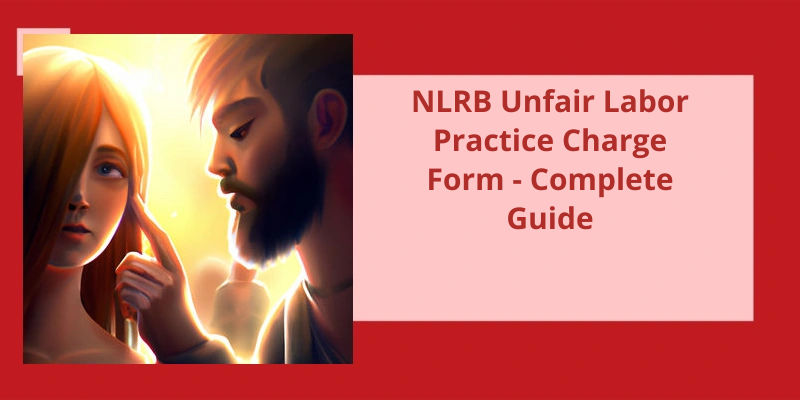The National Labor Relations Board (NLRB) is an independent federal agency tasked with protecting workers' rights to organize, bargain collectively, and engage in other union activity. One of the NLRB's crucial responsibilities is investigating and enforcing unfair labor practice charges filed by workers or unions against employers. These charges can range from retaliation against workers who engage in protected activities to refusal to bargain in good faith with union representatives. To file an unfair labor practice charge with the NLRB, individuals or unions must complete the appropriate form and provide documentation to support their claim. This process is vital in ensuring that workers' rights are protected and that employers who violate labor laws are held accountable.
What Happens After an Unfair Labor Practice Charge Is Filed?
The NLRB investigates charges and decides whether to dismiss the charge or proceed with legal action against the employer. If the NLRB decides to proceed, the legal process can be lengthy and complicated. The employer and the NLRB may attempt to negotiate a settlement before going to trial.
During the investigation process, the NLRB will gather evidence through interviews, written statements, and other means. The parties involved may also be asked to provide evidence and documentation related to the charge. If the NLRB finds that there’s sufficient evidence to support the charge, the case may proceed to a formal hearing.
If the case goes to trial, a judge will hear arguments from both sides and make a decision. The judge may find that the employer engaged in unfair labor practices and order them to take specific actions to remedy the situation. The employer may also be required to pay back wages or offer reinstatement to any employees who may have been unlawfully fired or disciplined.
If the employer is found to have committed an unfair labor practice, they may also be required to post notices informing employees of their rights and the actions the employer must take to remedy the situation. The notice must be posted in a prominent location where all employees can see it.
Overall, the process following an unfair labor practice charge can be complex and time-consuming. However, it’s important to pursue charges if you believe your employer has engaged in unfair labor practices. The NLRB exists to protect the rights of workers and ensure employers adhere to labor laws. If you’ve questions about the process or need assistance, there are many resources available, including labor attorneys and labor organizations.
How Can an Employer Prevent Unfair Labor Practice Charges and Maintain Positive Labor Relations With Their Employees?
- Be fair and consistent with policies and procedures.
- Communicate openly and honestly with employees.
- Ensure that managers and supervisors are well-trained in labor laws and regulations.
- Encourage employee participation and input.
- Recognize and respect employees’ rights to form unions or engage in collective bargaining.
- Regularly review and update employment policies to ensure compliance with labor laws.
- Provide competitive compensation and benefits.
- Maintain a positive work environment where employees feel valued and respected.
- Address employee concerns and grievances in a timely and effective manner.
- Conduct regular employee satisfaction surveys and act on the feedback received.
It’s important to know your rights as an employee or union member under the National Labor Relations Act (NLRA), and if you feel those rights have been violated, you’ve the right to file an unfair labor practice charge with the National Labor Relations Board (NLRB). However, there’s a deadline for filing such a charge, which is generally six months from the date of the violation. This article will explore the process for filing an unfair labor practice charge and what to expect during the investigation and resolution of the charge.
How Long Does a Party Have to File an Unfair Labor Practice Charge With the NLRB?
The National Labor Relations Act (NLRA) provides employees with the right to engage in union activities and bargain collectively with their employers. However, the NLRA also protects employees from retaliation, harassment, and discrimination for engaging in these activities. If you believe your employer or union has violated your NLRA rights, you may be able to file an unfair labor practice charge with the National Labor Relations Board (NLRB).
In general, you must file an unfair labor practice charge with the NLRB within six months of the alleged violation. This means that if you were fired or punished for engaging in protected activity, you’ve six months from the date of the adverse action to file a charge. Similarly, if your employer refuses to bargain with your union, discriminates against union members, or engages in other unfair practices, you’ve six months from the date of the violation to file a charge.
It’s important to note that the six-month filing period isn’t a statute of limitations. Instead, it’s a procedural requirement that must be met in order for the NLRB to consider your charge. If you fail to file a charge within the six-month period, the NLRB may dismiss your charge as untimely. However, there may be exceptions to this rule, such as if the violation was concealed from you or if you were unable to file because of circumstances beyond your control.
You may also be required to provide additional information, such as evidence of the violation and a list of witnesses. Once the charge is filed, the NLRB will investigate the allegations and determine whether there’s sufficient evidence to support the charge.
If the NLRB finds that an unfair labor practice has occurred, it may order the employer or union to cease and desist from the unlawful conduct and take other remedial actions. However, if the NLRB finds no evidence of a violation or determines that the charge is untimely, it may dismiss the charge without taking any further action.
By doing so, you may be able to obtain relief and protect your rights as an employee.
How Does the NLRB Investigate and Determine Whether an Unfair Labor Practice Has Occurred?
The National Labor Relations Board (NLRB) investigates and determines whether an unfair labor practice has occurred through a process that involves gathering evidence, conducting interviews, and analyzing the facts to make a decision based on legal standards and precedent.
It’s important for employers to understand the consequences of violating the National Labor Relations Act (NLRA), as it can result in legal action taken against them by the National Labor Relations Board (NLRB). If the NLRB determines that an employer has violated employees’ rights, the affected employees may be awarded appropriate remedial relief, including but not limited to reinstatement and payment of lost wages and benefits. Understanding the NLRA and abiding by it’s guidelines is crucial for employers to avoid legal repercussions.
What Happens if an Employer Violates NLRA?
The National Labor Relations Act (NLRA) is designed to protect the rights of workers to organize and bargain collectively with their employers. If an employer violates the NLRA, they could face serious consequences. Employees have the right to file complaints with the National Labor Relations Board (NLRB), and the agency has the power to investigate and take action against employers who violate the law.
One of the most common ways that employers violate the NLRA is by interfering with employees right to organize and join a union. This can include intimidating, threatening, or retaliating against employees who participate in union activities. Employers may also try to discourage unionization by offering bribes or other incentives to employees who decline to join a union.
Employers who engage in such practices may be subject to fines, penalties, and other legal consequences.
The agency will investigate the complaint and determine whether the employer has violated the law. If the NLRB finds that a violation has occurred, it may order the employer to take corrective action, such as reinstating an employee, compensating them for lost wages and benefits, and posting notices to inform employees of their rights.
It’s important for employers to be aware of their obligations under the law and to take steps to ensure that they comply with the NLRA and respect their employees rights to organize and bargain collectively.
How to File an NLRA Complaint and Navigate the NLRB Process
- Research and gather information on your NLRA violation claim.
- Fill out the NLRB’s Form 501, the “Charge Against Employer.”
- Submit the filled-out form to the appropriate NLRB Regional Office.
- Wait for the NLRB to investigate and take action on your complaint.
- If necessary, attend a hearing and provide evidence to support your claim.
- Observe the NLRB’s decision and any remedies ordered.
Now that it’s been established how an unfair labor practice case gets to the point of being heard, it’s important to understand who decides the case. Once a complaint has been issued, it’s the responsibility of an administrative law judge to hear the case and make a decision. This decision and recommended order can then be further appealed to the Board located in Washington. Let’s take a closer look at the role of administrative law judges in NLRB cases.
Who Decides NLRB Cases?
The National Labor Relations Board (NLRB) is responsible for overseeing and interpreting federal labor laws in the United States. When disputes arise between employees and employers, the NLRB has the authority to investigate and resolve these issues. One of the ways the NLRB does this is through administrative law judges (ALJs), who’re responsible for hearing and deciding cases brought before the board.
After a regional director issues a complaint in an unfair labor practice case, the case is assigned to an ALJ who’ll hear the arguments and evidence presented by both sides. The ALJ will then make a decision and issue a recommended order, which outlines the specific actions that should be taken to remedy the unfair labor practices that were found to have occurred.
ALJs are independent adjudicators who’re appointed by the NLRB to hear and decide cases. They’re experienced attorneys who’ve a deep understanding of labor law and have been trained to apply legal principles and rules to the specific facts of each case they hear. They’re typically selected for their impartiality, expertise, and experience, and are expected to make decisions based solely on the evidence presented in the case.
Once an ALJ issues a decision and recommended order, either party can appeal the decision to the full board in Washington, D.C. The board reviews the record from the ALJs hearing and makes a final decision on the case. If the board upholds the ALJs decision, it becomes a final order, and the parties are required to comply with it. If the board overturns the decision, the case may be remanded back to the ALJ for further hearings or a new decision.
It’s decisions can have a significant impact on both employees and employers, which is why the process for deciding cases is so important. By relying on experienced ALJs to hear and decide cases, the NLRB is able to ensure that each case is considered thoroughly and impartially, and that the rights of both parties are protected throughout the process. Ultimately, the goal of the NLRB is to promote harmonious relationships between employees and employers and protect the right of workers to negotiate collectively for better wages and working conditions.
The Process for Filing a Complaint With the NLRB and What Happens After a Complaint Is Filed
- Visit the National Labor Relations Board (NLRB) website
- Locate the “File a Charge” page
- Complete the Board’s online form, providing your name, contact information, and a detailed description of the alleged unfair labor practice
- Submit the form electronically
- The NLRB will investigate the charge and may dismiss it if it determines that it lacks merit or is untimely
- If the NLRB chooses to pursue the charge, it will issue a complaint and schedule a hearing
- The hearing will be held before an administrative law judge, who’ll make a determination as to whether the alleged unfair labor practice occurred
- If the judge finds in favor of the charging party, the NLRB may order the employer to cease and desist from the illegal activity, take affirmative action to remedy the harm caused, and provide back pay and other remedies to affected employees
- If the judge finds in favor of the employer, the charge will be dismissed
Filing a petition with the National Labor Relations Board (NLRB) can be an intimidating process, but it shouldn’t be. Knowing the steps ahead of time can help ease any anxiety and ensure that your petition is filed correctly. The following steps will help guide you through the process to file a petition with the NLRB.
How Do I File a Petition With NLRB?
Filing a petition with the National Labor Relations Board (NLRB) is a process that can be daunting for those who aren’t familiar with it. However, it’s an important step for employees seeking to assert their rights under the National Labor Relations Act (NLRA) and ensure a fair workplace. There are several steps one must take to file a petition with the NLRB, starting with completing NLRB Form 502.
This initial step is critical, as it provides the NLRB with essential information about the circumstances surrounding the dispute. The form asks for basic information such as the name and address of the employer, the nature of the dispute, and the number of employees involved. The form can be obtained by contacting an information officer at the nearest Regional Office, who can also provide assistance with completing the form.
Once the Form 502 is completed, the next step is to gather the necessary documents. This includes the blank NLRB Form 505 – Statement of Position, which must be completed by the employer or their representative, as well as NLRB Form 4812 – Description of Procedures. The Statement of Position provides the employer with an opportunity to respond to the petition and provide their perspective, while the Description of Procedures outlines the steps and timelines involved in the NLRB process.
Generally, this must be done within six months of the alleged unfair labor practice or a showing of majority interest in forming a collective bargaining unit. Failure to file within this timeframe could result in the case being dismissed.
Once the necessary forms are completed and gathered, they must be filed with the appropriate Regional Office of the NLRB. This can be done either by mail or in person, and the filing fee must be paid at the time of filing.
Finally, it’s essential to choose a union or other representative to act on behalf of the employees in the dispute. The chosen representative will work with the NLRB and the employer to negotiate a resolution to the dispute, which may include a collective bargaining agreement or other remedies.
What Types of Disputes Fall Under the Jurisdiction of the NLRB?
The National Labor Relations Board (NLRB) has jurisdiction over disputes related to labor rights and union-management relations, such as unfair labor practices, union elections, collective bargaining, and strikes.
Once you’ve filed a charge with the National Labor Relations Board (NLRB), the case isn’t simply left to sit. In fact, it’s thoroughly investigated by Board agents who gather evidence and take statements from relevant parties and witnesses. Depending on the severity and novelty of the case, further review by attorneys may be necessary before any action is taken. So what happens after these investigations are complete?
What Happens After You File a Charge With the NLRB?
If the Regional Director determines that there’s merit to the charge, the parties may be offered an opportunity to resolve the case voluntarily through an informal settlement agreement. If the case can’t be settled, the Regional Director will issue a complaint, which is a formal legal document that charges the employer with an unfair labor practice.
Once a complaint is issued, the case is assigned to an Administrative Law Judge (ALJ) who holds a hearing to determine whether the allegations in the complaint are true. The parties may present testimony from witnesses, including union officials, employees, and representatives of the employer. The ALJ will issue a decision, which may be appealed to the full Board in Washington DC.
If the Board finds that an unfair labor practice has occurred, it will issue an order requiring the employer to cease and desist from committing the unfair labor practice and to take affirmative action to remedy any harm caused by the conduct. This may include reinstating unlawfully terminated employees, reimbursing employees for lost wages, and posting notices informing employees of their rights under the National Labor Relations Act.
If an employer refuses to comply with a Board order, the Board may seek enforcement in federal court. Alternatively, if the Board finds that a charge lacks merit or if the parties settle the case, the charge may be dismissed. In some cases, the Board may issue a decision without a hearing, based on a stipulation between the parties.
Overall, the NLRB plays a critical role in protecting the rights of employees to engage in concerted activity to improve their working conditions. Filing a charge with the NLRB is an important step that may lead to a resolution of workplace concerns and a fair outcome for all parties involved. Employers must take allegations of unfair labor practices seriously and be prepared to defend their actions before the Board. Through this process, the NLRB promotes fairness and equality in the workplace, helping to create a stronger, more stable economy for all Americans.
Conclusion
Understanding the nuances of the form and ensuring that it’s properly filed can make all the difference in protecting your workplace rights and securing fair labor practices. This process highlights the importance of being informed and empowered in the workplace, and the critical role that the NLRB plays in upholding these principles. Ultimately, it’s essential that workers and unions are aware of their rights and responsibilities, and are equipped with the tools to hold employers accountable when those rights are violated.






